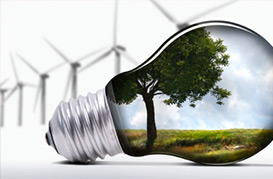Dec
 There have been many questions regarding this governments commitment to ‘green energy’ since the last cabinet reshuffle with the new energy minister having a reputation for being less than keen on renewables and investing in sustainable technologies. Are we still pursuing the goals we’ve set out or will things change direction somewhat? The UK population remains convinced that the sustainable, green, renewable…call it what you like, is here to stay and a reasonable proportion are happy to invest in it either on a domestic or commercial basis. Perhaps the uptake may be slower than hoped and having taken the odd beating here and there [especially with Feed In Tariff cuts] – but it is not going to be stopped. continue
There have been many questions regarding this governments commitment to ‘green energy’ since the last cabinet reshuffle with the new energy minister having a reputation for being less than keen on renewables and investing in sustainable technologies. Are we still pursuing the goals we’ve set out or will things change direction somewhat? The UK population remains convinced that the sustainable, green, renewable…call it what you like, is here to stay and a reasonable proportion are happy to invest in it either on a domestic or commercial basis. Perhaps the uptake may be slower than hoped and having taken the odd beating here and there [especially with Feed In Tariff cuts] – but it is not going to be stopped. continue
- Bookmark :
- Digg
- del.icio.us
- Stumbleupon
- Redit it
Sep
NOTE:This video provides SME businesses with a step by step guide to reducing energy costs, conserving energy and initial advice on using green technologies. If you have not already applied these recommendations, following these steps WILL save you money.
The Nottingham Energy Partnership is a registered charity with 10 years experience in driving the forward the climate change agenda and educating public about the energy efficiency among other issues. Jerome Baddley, Sustainable Energy Development Manager from Nottingham Energy Partnership was interviewed by Torse about conservation of energy, the barriers to businesses making the most of savings and efficiencies and the ways in which business can reduce energy bills, moderate costs and increase energy savings. You can see more information at http://www.nottenergy.com.
Video Content
00:19 > 01:06 – Introduction to NEP activities
01:08 > 02:06 – Typical resistance to change from SME businesses
02:06 > 02:39 – Businesses do not want disruption to operations
02:39 > 03:18 – Top management level often requires culture change
03:20 > 04:12 – The future of the energy market and rise in energy costs
04:13 > 06:44 – What businesses can do to reduce energy costs
06:45 > 09:13 – Alternatives to reduce costs and the hierarchy of savings
09:14 > 09:36 – Reducing carbon emissions
- Bookmark :
- Digg
- del.icio.us
- Stumbleupon
- Redit it
Nov
Sun Sets on Solar Subsidies?
Posted by (0) Comment
 The Deptartment of Energy and Climate Change subsidies for Renewable Energy have been very successful, the majority of the Feed-In tariff support going to Solar Energy Schemes, almost too successful perhaps.
The Deptartment of Energy and Climate Change subsidies for Renewable Energy have been very successful, the majority of the Feed-In tariff support going to Solar Energy Schemes, almost too successful perhaps.
continue
- Bookmark :
- Digg
- del.icio.us
- Stumbleupon
- Redit it
Jun
Support for Solar
Posted by (0) Comment
 Whilst there seems to be an almost hysterical hype surrounding supposed alternative or green energy resources, in 2010 the UK government will be introducing a Feed-In Tariff to “help promote solar power and reduce carbon dioxide emissions” which on the face of it seems to provide genuine incentive for UK businesses to invest in solar energy with both financial and environmental benefits.
Whilst there seems to be an almost hysterical hype surrounding supposed alternative or green energy resources, in 2010 the UK government will be introducing a Feed-In Tariff to “help promote solar power and reduce carbon dioxide emissions” which on the face of it seems to provide genuine incentive for UK businesses to invest in solar energy with both financial and environmental benefits.
A Feed-in Tariff (FIT) provides a long-term financial incentive for people to invest in renewable energy. Under a FIT system electricity companies are obligated by governments to buy renewable electricity at above market rates.
The Feed-in Tariff will help reduce global warming, boost UK clean-tech jobs and reward people for installing solar power.
It is important the Feed-in Tariff is set at the correct rate. If it’s too low the potential for a massive increase in the UKs solar energy could be lost, and we could be left behind the rest of Europe.
We Support Solar website
Find out more about this by visiting the We Support Solar website and you can show your support for solar energy and the potential uses for business and domestic buildings by registering your interest in this scheme.
- Bookmark :
- Digg
- del.icio.us
- Stumbleupon
- Redit it




